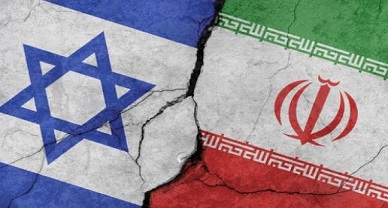Navigating the Complexities of the Israel-Iran Conflict: Historical Perspectives and Other Implications
Introduction
Amid the recent news of Iran announcing war in Israel, the nations are on the verge of witnessing a new aggression when already the Israel-palestine issue is nowhere near resolution. But why now this sudden aggression? to briefly summarise the recent happenings, it started on the night of 13th April 2024 when Iran along with some allies launched around 170 bomber drones and more than 300 missiles on Israel in retaliation to the suspected Israeli airstrike of the Iranian consulate in Syria killing Mohammad Reza Zahedi who was the top commander of the Islamic revolutionary guard corps (IRCG) who is suspected to be the person behind many attacks on Israel including the most recent one related to Gaza. The recent happenings has led to a spike in oil prices and panic in the international markets.
Historical view behind the Israel Iranian conflict:
The tensed relations between the two nations were not always like that, infact Tehran was just the second Islamic nation to have recognised Israel. In the period of 1925 , the Pahlavi dynasty used to rule Iran which was surprisingly pro-west under the king’s rule, comparatively much more modern and secular compared to the present status as a result the relations between Iran and Israel were very good. However, it all ended in 1971 when Iran’s religious political leader, Ayatollah Khomeini came into power under whose leadership Iran called itself the leader of the Shia muslims of the world and in order to appease the muslim ally countries, Iran started taking anti-Israel stances since 1979.
How has Israel being able to defend itself against the attacks?
Well it is of no surprise that the Israeli defense system is one of the best in the world. Israel is the only nation on which attacks have been made from all borders since birth as a result Israeli government has two smart strategies to save its citizens. First being the compulsory building of bunkers under offices and houses throughout Israel in order to protect them from air strikes and any other possible attacks. Secondly, the deployment of such multi-layered air defence systems to protect its 22,145 square kilometers of airspace such as the Arrow, David’s Line and the famous Iron Dome. Because Israel has deployed such defense systems throughout the entire country, the whole of the country has become a protection shield.
The allies of Israel and Jordan’s surprising stance
The other reason of how Israel is still strong despite these aggression has been its allies. This time, Jordan especially showed some extraordinary behaviour. The country which wanted to erase Israel from the world map and has been a prominent enemy during the famous 6 day war went against the Islamic countries and helped Israel. The Jordanian king openly said that he will not allow Iran to play on Jordan’s territory at all. Just like Iran is turning Syria, Iraq and Lebanon into war zones for its selfish reasons, he will not allow the same to happen with Jordan. The reason for the same is historically, for all its wars, Jordan always suffered the greatest loss and has learnt its lesson that fighting with such a technologically advanced nation would only cause harm. Hence, it was the only second country after Egypt to sign Oslo peace accord with Israel. This has been the reason why Jordans economic status and governmental stability has improved compared to other countries in the middle east, the sharing of technological inputs between the two nations. The US even though distances itself from the attack on Iran, it had deployed its forces in the Mediterranean sea after the April 1 airstrike, and similar support has been showed by France and the UK which has been described as an international coordinated effort which saved lives in Israel and neighbouring countries.

Personal Interests leading to wars:
It seems kind of odd for a country to launch hundrends of missiles some even being ballistic in nature for a single person. Especially when an enemy like Israel is standing in front. The reason for the same is the personal interests of these leaders. The reason for Ayatollah to come into power has been the IRGC, but now many of his allies like Qasem Soleimani in 2020 and a few days ago top commanders like Mohammad Raza Zahedi were killed. In such situation, the pillars that made Ayatollah powerful are breaking one after another and that too, in a time when there are a lot of social and political problems in Iran. Major protests regarding economic slowdown, hyperinflation and anti-hijab are going on. Therefore to divert the media attention attacking Iran against Israel seems to be the strongest move. So that people unite in the name of nationalism and religion and keep building the power of Ayatollah. To a large extent, it has been successful.
Similar personal motives can be seen for Israeli President Netanyahu. Last year, when he tried to bring a bill to the Israeli parliament, which could have given him the power to change any decision of the Israeli supreme court with a simple majority, the Israeli population protested against it. Even the defence force , the reserve army, openly warned that people might not come to their jobs. Citizens even started demanding new elections directly. But then came the infamous Hamas attack on 7th October which suddenly brought people together with Netanyahu which empowered him to still be the Israeli prime minister.
Conclusion
To conclude often these wars work like a uniting force for leaders because during that time, all the problems of the nation becomes one. And if the leaders take very aggressive decisions in such times, then the popularity of the leader increases in the country as people symbolise them as a symbol of safety and security. That said for now, west asia is not ready for another damaging war between its nations. As no Iranian or Israeli would prefer anymore killings and thus the top priority for these nations right now should be de-escalation of its forces with Israel focusing on winding down the aggression for its Gaza operation and for Iran to look into its internal societal and economic problems and to reign in its militias. Instead of being an audience for some greater mishap, the countries needs to end the strikes now.
Author:-Manishe Srivastava, in case of any queries please contact/write back to us at support@ipandlegalfilings.com or IP & Legal Filing.


